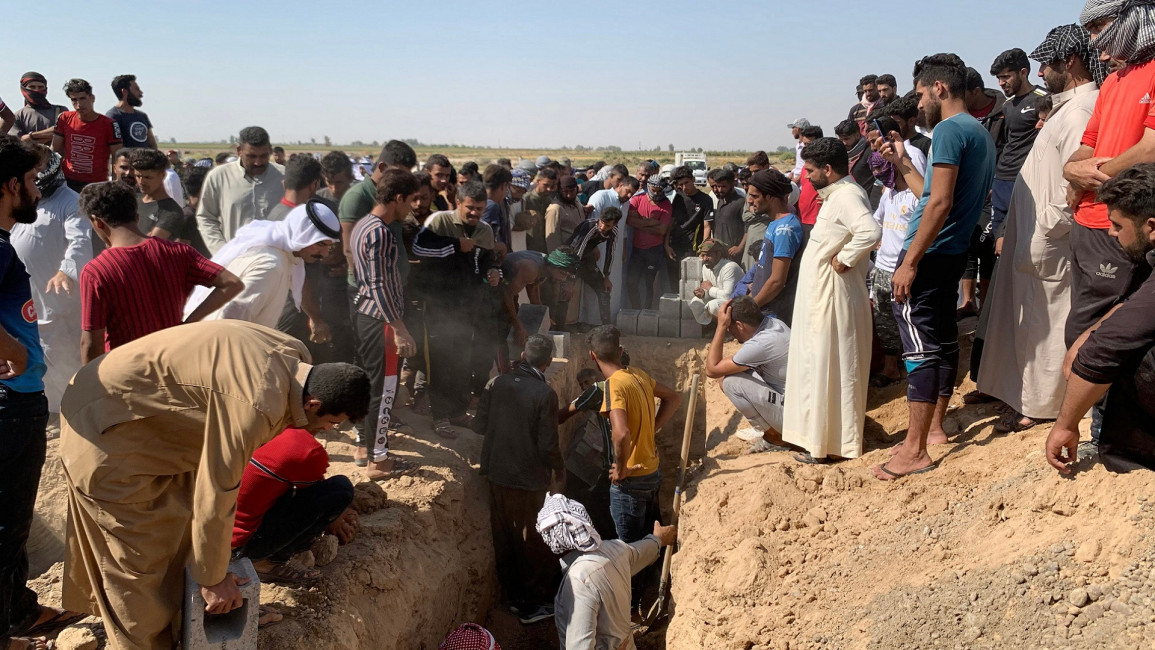Anger in Iraq as government stalls investigation into Farhatiya killings
At least eight men and boys, thought to be related, were killed in the horrific incident in Farhatiya, in the Sunni-majority province of Salaheddin, by militants suspected to be from Asa'ib Ahl al-Haq, a pro-Iranian Shia militia, which is part of the Popular Mobilisation Forces (Hashd al-Shaabi) coalition.
Several other residents of Farhatiya were kidnapped by militiamen during the incident, but no trace of them has yet been found.
Read more: The Iraq Report - Sectarian killings revive fears of strife under an 'unsustainable' system
Following the incident, Iraqi Prime Minister Mustafa Al-Kadhimi visited Farhatiya and promised to find the perpetrators within 72 hours, while the Iraqi parliament formed a committee to investigate the killings. Neither the PM nor the parliament have announced any results so far.
An Iraqi official who requested anonymity told The New Arab’s Arabic-language service that the parliament’s committee had reached results in its investigation but needed Kadhimi's approval to publish them.
"There is political pressure on the prime minister and members of the investigative committee to publish results to the investigation but the prime minister prefers to wait."
He said that the evidence pointed to the Asa’ib Ahl Al-Haq militia’s involvement in the killings and that at least eleven individuals had been identified as possible suspects but that the militia’s leader, Qais Al-Khazali, had refused to cooperate with the investigation.
The official said that members of the security forces had been complicit in the massacre, turning a blind eye to the Asa’ib Ahl al-Haq militia’s activities.
Trying to pin the blame on IS
Najeh Al-Mizan, a politician from Salaheddin province, told The New Arab’s Arabic-language service that Asa’ib Ahl Al-Haq and other Iran-backed PMF militias were trying to evade responsibility by blaming the incident on the Islamic State (IS) militant group.
Local people believe that the men that carried out the attack were acting in revenge for the killing of a militia man by IS.
IS, which was militarily defeated in Iraq in 2017, was previously in control of Salaheddin province and still operates there.
Read more: Iraq's reign of fear - Inside the violent power struggle killing Basra's activists
Shortly after the massacre, a PMF official issued a statement blaming the extremist group for it. Last Wednesday, a spokesman from the Iraqi military said that "IS terrorist gangs could be behind the crime in Farhatiya," and this led to a public backlash.
Al-Mizan predicted that the Iraqi government would cave in to pressure not to reveal the true identity of the killers.
"Not revealing the truth that the people of Farhatiya and Iraqis in general know will create a crisis in confidence and public anger at the government. The prime minister must reveal the perpetrators and not stall," he said.
"IS have carried out many crimes against the people of the liberated cities but many other crimes have been committed by pro-Iran militias as well, and IS were accused of these."
He said that the PMF militias wanted to change the sectarian demographics of Salaheddin province and permanently control Sunni-majority cities. Human rights groups have previously accused the militias of carrying out sectarian cleansing and other abuses in the area.
However, a PMF spokesman told The New Arab’s Arabic-language service that investigations were ongoing "but needed time to gather more information".
The leader of the PMF, Faleh al-Fayyad had previously denounced the killings as a crime.
In recent months, pro-Iran militias have been accused of responsibility for several killings including those of Riham Yaaqoob and Tahsin Osamah, two anti-corruption activists from Basra, and Hisham Hashimi, a high-profile expert on IS.
Follow us on Facebook, Twitter and Instagram to stay connected



